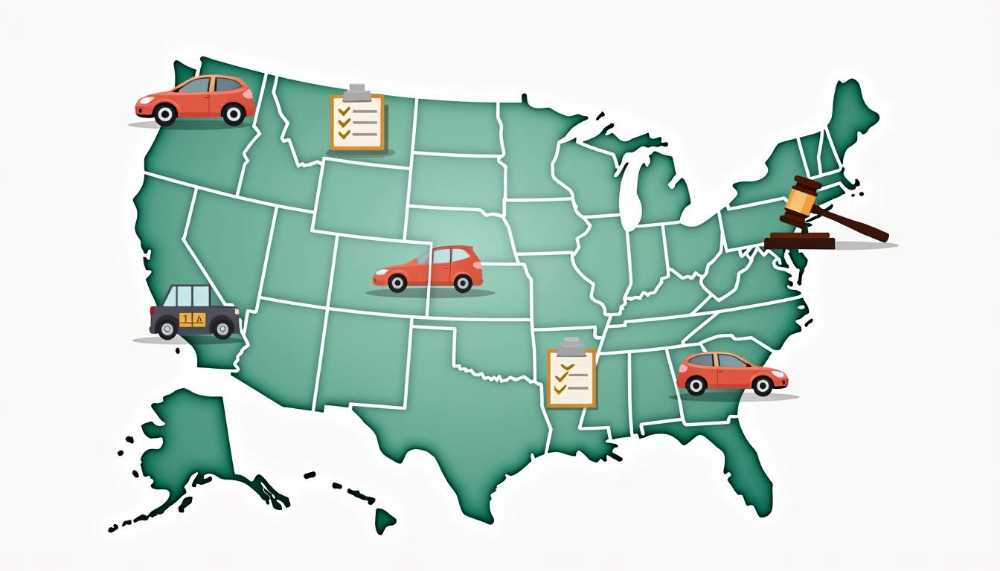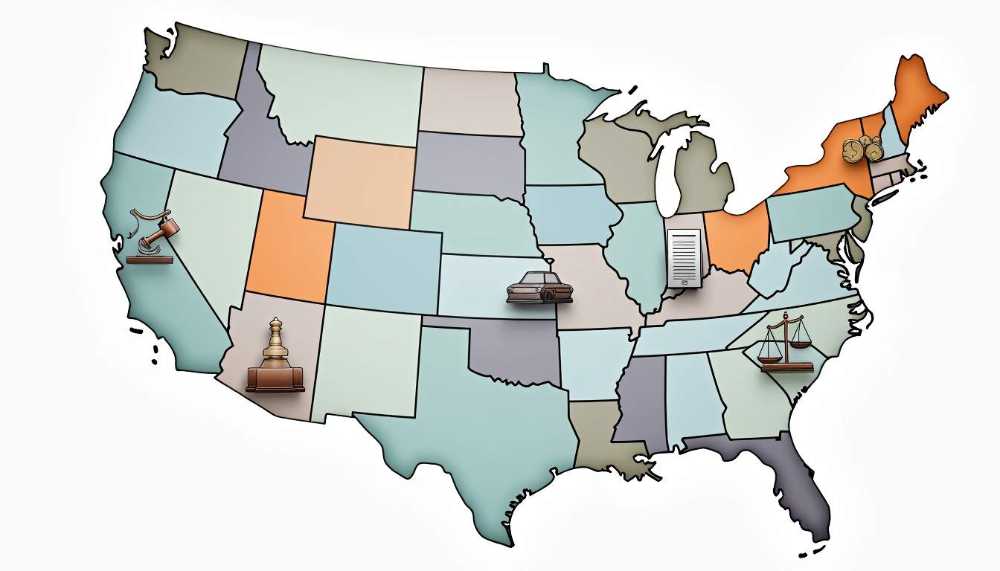Auto loan refinancing has become an increasingly popular financial strategy for car owners looking to reduce their monthly payments, lower their interest rates, or change the terms of their loans. However, the process of refinancing an auto loan does not occur in a legal vacuum; it is heavily influenced by state-specific laws that can vary significantly across the United States. Understanding these laws is crucial for borrowers who wish to navigate the refinancing process effectively.
Understanding Auto Loan Refinancing
Auto loan refinancing involves taking out a new loan to pay off an existing auto loan. This new loan typically comes with different terms, which may include a new interest rate, monthly payment, or loan duration. Borrowers often seek refinancing to improve their financial situation, such as decreasing their financial burden or obtaining better loan terms.
The Basics of Auto Loan Refinancing
The refinancing process usually starts with the borrower researching potential lenders. It is important to compare offers from various financial institutions, as their terms, fees, and interest rates can differ. Once the borrower selects a lender, they must complete the application process, which often includes providing personal information, credit history, and details about the vehicle.
After the lender reviews the application, they will determine whether to approve the loan and under what terms. If approved, the new lender pays off the old loan, and the borrower begins making payments to the new lender. Understanding the basics of this process lays the foundation for borrowers to make informed decisions about their refinancing options. Additionally, it is beneficial for borrowers to check their credit score before applying, as a higher score can lead to more favorable terms. Many lenders offer tools to help borrowers estimate their potential savings, which can be a valuable resource during the decision-making process.
Benefits and Risks of Auto Loan Refinancing
Refinancing an auto loan can have several benefits. Firstly, it can lower monthly payments, making it easier for borrowers to manage their budgets. Additionally, a lower interest rate can save borrowers money over the life of the loan. Furthermore, changing the loan duration can help borrowers pay off their vehicles faster or extend payments to reduce financial pressure. Some borrowers may also find that refinancing allows them to tap into equity built in their vehicle, providing funds for other expenses or investments.
However, refinancing also comes with risks. If borrowers extend the loan duration, they may end up paying more in interest over time, even if the monthly payments are lower. Additionally, in some cases, borrowers may encounter penalties for paying off their original loan early. It's crucial for borrowers to weigh these risks against the potential benefits carefully before deciding to refinance. Moreover, it’s essential to consider the overall financial landscape; for instance, if a borrower’s financial situation has deteriorated since the original loan was taken out, they may not qualify for better terms, which could lead to disappointment. Understanding these dynamics can empower borrowers to navigate the refinancing landscape more effectively and make choices that align with their long-term financial goals.
The Impact of State Laws on Auto Loan Refinancing
State laws can significantly impact the auto loan refinancing process. Each state has its own regulations regarding interest rates, loan terms, and disclosure requirements. As a result, it's essential for borrowers to familiarize themselves with the laws in their respective states before proceeding with refinancing.
How State Laws Regulate Auto Loan Refinancing
State regulations determine various aspects of auto loan refinancing, including maximum interest rates and required disclosures. For instance, some states enforce usury laws that limit how much interest lenders can charge, while others may not have such regulations. Additionally, states have different requirements for contract transparency, ensuring that borrowers are fully aware of all terms before agreeing to a loan.
Moreover, the process of refinancing may also be impacted by state-specific licensing requirements for lenders. Some states require lenders to obtain a specific license to offer refinancing options, ensuring that consumers are protected from predatory lending practices.
Differences in State Laws Regarding Auto Loan Refinancing
The differences in state laws can lead to a wide variety of experiences for borrowers. For instance, while some states offer favorable conditions for refinancing, such as lower maximum interest rates or fewer fees, others may present hurdles that make refinancing more challenging.
Additionally, some states may have specific laws regarding post-refinancing disclosures, requiring lenders to provide borrowers with information about their rights after refinancing. Understanding these differences can empower borrowers to make better decisions throughout the refinancing process.
Furthermore, the geographical diversity of state laws means that borrowers in states with more stringent regulations might find themselves at a disadvantage compared to those in more lenient states. For example, a borrower in a state with strict interest rate caps may have a more straightforward path to refinancing at a lower rate, while a borrower in a state without such protections may face higher costs and less favorable terms. This disparity can lead to a sense of frustration for those who feel constrained by their state's regulations, highlighting the importance of advocating for consumer-friendly laws that promote fair lending practices across all states.
In addition to interest rates and fees, state laws can also influence the types of loans available for refinancing. Some states may have specific programs designed to assist borrowers with lower credit scores or those facing financial hardship, while others may lack such initiatives altogether. This variation can affect not only the options available to borrowers but also their overall financial health. By exploring state-specific programs and resources, borrowers can uncover potential opportunities that align with their refinancing goals, ultimately leading to more informed and beneficial financial decisions.
Navigating Auto Loan Refinancing in Different States
Borrowers need to be strategic when navigating the refinancing landscape across different states. A solid understanding of the particular rules and regulations of each state can be instrumental in securing the best refinancing deal.
Key Considerations for Auto Loan Refinancing in Various States
One of the key considerations for borrowers is to stay informed on their state's specific laws regarding auto financing. This includes not only interest rates and fees but also consumer protections and what recourse is available if things go wrong. Being equipped with this knowledge can lead to more advantageous negotiations with potential lenders.
Additionally, borrowers should look into the reputation and regulatory compliance of lenders operating in their state. Some lenders may be well-known for being transparent and fair, while others might have poor track records. Checking reviews and consumer feedback can provide valuable insights.
State-by-State Guide to Auto Loan Refinancing Laws
A comprehensive guide highlighting the specifics of auto loan refinancing laws in each state can serve as an invaluable resource for borrowers. Such a guide typically covers interest rate limits, required disclosures, and other pertinent regulations that could affect the refinancing process.
For instance, states like California may have lower interest rate caps compared to states like Texas. Understanding these nuances can help borrowers identify where they can find favorable terms for refinancing.
Legal Implications of Auto Loan Refinancing
The legal landscape surrounding auto loan refinancing can be intricate. Understanding the potential legal implications is crucial for borrowers seeking to protect their rights and interests.
Legal Consequences of Violating Auto Loan Refinancing Laws
Violating state laws during the refinancing process can have significant legal consequences. For lenders, non-compliance can lead to fines and penalties. For borrowers, it could result in unjust loan terms or fees that were not disclosed. In extreme cases, cases can escalate to a court, leading to costly legal battles.
It's essential for both lenders and borrowers to adhere strictly to the state laws in place to avoid these negative outcomes. Educating oneself about the relevant regulations will help individuals navigate the risks effectively.
Legal Protections for Consumers in Auto Loan Refinancing
Many states have legislated protections specifically aimed at consumers engaging in auto loan refinancing. These regulations often involve requirements for lenders to provide clear and accurate information regarding loan terms, fees, and potential penalties. Such protections are designed to ensure that borrowers are fully informed and can make decisions that are in their best interests.
Additionally, consumers may have the right to rescind their refinancing agreements within a specific timeframe—a crucial protection for those who feel they have been misled.
Future Trends in Auto Loan Refinancing Laws
As borrowing methods evolve and the financial landscape changes, state-specific laws surrounding auto loan refinancing are expected to adapt as well. Staying ahead of these trends can be beneficial for borrowers.
Predicted Changes in State-Specific Auto Loan Refinancing Laws
Experts predict that many states may begin to implement more consumer-friendly regulations in the coming years. This could include the introduction of lower interest rate caps or enhanced protections against predatory lending. As awareness about consumer rights increases, legislators may be compelled to act in favor of borrowers.
Additionally, advancements in technology and online lending platforms may lead to increased scrutiny from regulators. The rise of digital lending practices may prompt states to develop new frameworks to govern these practices effectively.
How Future Legislation Could Impact Auto Loan Refinancing
Future legislation may significantly influence how borrowers approach auto loan refinancing. Favorable changes could reduce barriers, enabling more consumers to access lower rates and better loan terms. Conversely, stricter regulations could impose additional responsibilities on lenders, leading to increased costs that may be passed down to borrowers.
In summary, the landscape surrounding auto loan refinancing is continuously developing. Being informed about current and anticipated changes in state-specific laws can equip borrowers with the knowledge necessary to make empowered financial choices.






